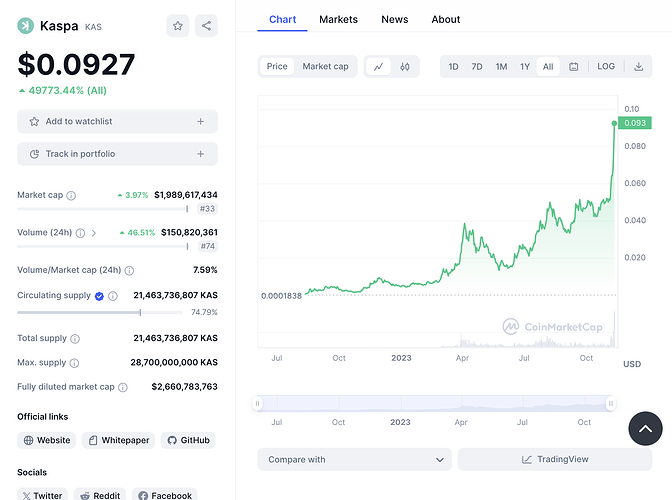Kaspa coin is among the few cryptocurrency projects currently drawing attention for utilizing the Proof-of-Work (PoW) algorithm. In this article, let’s explore what Kaspa coin is, how it operates, and assess whether this cryptocurrency investment holds potential.
Between November 2022 and November 2023, the price of KAS has experienced a substantial increase of approximately 2,2xx%.
What is the Kaspa cryptocurrency project?
Kaspa is recognized as a layer-1 blockchain with one of the fastest speeds, decentralized, openly sourced, and highly scalable. Operating as a blockDAG on the Phantom GOSHDAG network, Kaspa employs the kHeavyHask hashing algorithm and utilizes the Proof-of-Work (PoW) consensus mechanism.
Kaspa is recognized as a technology project inspired by blockchains such as Bitcoin, Litecoin, and Monero. Unlike conventional cryptocurrency projects, the Kaspa blockchain utilizes Directed Acyclic Graph (DAG) to monitor transactions. This enables it to simultaneously process multiple blocks, significantly enhancing scalability compared to previous PoW blockchains.
What is KAS Coin?
KAS Coin serves as the native cryptocurrency of the Kaspa platform. Employing the PoW algorithm, KAS Coin records new blocks on the network and verifies transactions. With a scalability of up to thousands of transactions per second, KAS Coin supports a wide range of applications, including complex ones.
Additionally, KAS Coin functions as the official token within the Kaspa Network ecosystem. It is used for transaction fees and serves as a means of exchange for various services on the network.
Total Supply: 21,463,736,807 KAS
Maximum Supply: 28,700,000,000 KAS
How does Kaspa (KAS) operate?
The operation of Kaspa is similar to Bitcoin, with some notable differences. Instead of using a linear blockchain to record transactions, Kaspa utilizes a Directed Acyclic Graph (DAG) - a type of non-cyclic directional graph. This allows the Kaspa network to process a large number of transactions simultaneously, enhancing scalability.
Kaspa is the only network capable of withstanding high block rates while maintaining security through the Proof-of-Work (PoW) consensus algorithm. Currently, it operates at a speed of 1 block per second.
In the future, the project’s development team aims to expand processing capabilities to 100 blocks per second.
Kaspa also employs the kHeavyHash hashing algorithm, designed to consume less fuel than the conventional Proof-of-Work mechanism applied by Bitcoin. This makes the process of mining KAS coins more efficient and environmentally friendly.
What are the notable features of Kaspa?
Kaspa cryptocurrency project possesses several superior alternative solutions compared to Bitcoin:
- Fast Transactions: Kaspa’s BlockDAG simultaneously generates multiple blocks per second to record transactions in its blockchain. This makes it an ideal platform for daily transactions without concerns about congestion issues.
- Instant Confirmation: Kaspa is designed to overcome transaction confirmation speeds hundreds of times faster than Bitcoin. On average, each transaction is fully confirmed in just 10 seconds.
- Scalability: Kaspa addresses scalability concerns by concurrently creating and committing multiple blocks per second. This does not compromise the system’s hierarchy and security.
- Efficient Mining: Kaspa utilizes the kHeavyHash algorithm to ensure energy-efficient mining, consuming less energy than other PoW networks. When combined with a high-throughput DAG, Kaspa operates extremely efficiently.
- Security: Kaspa ensures the safety of user transactions without compromising decentralization. The Kaspa network employs a pure Proof-of-Work algorithm, without token staking, combined with GhostDAG to address network security issues.
Join us at bitforum.net as we are The Social Network specialized on cryptocurrency.
